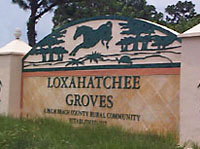On Tuesday, Dec. 5, the Loxahatchee Groves Town Council approved the preliminary reading of a trimmed-down nuisance abatement ordinance that would enable the town to charge residents on their tax bill for clearing overgrowth on roadways if they do not take care of it themselves.
Town Manager Bill Underwood said the ordinance puts in place a mechanism to clear the roads, giving the manager the appropriate vendors to cut back vegetation if necessary.
The ordinance originally included other nuisance issues within residents’ property, which the council pared down for possible consideration at another time.
Those items included the accumulation of trash, junk or debris, living and nonliving plant material, and stagnant water; the existence of all other objectionable, unsightly or unsanitary matter on improved or unimproved property; property inhabited by or providing a habitat for rodents and other vermin or wild animals; property providing a breeding place for mosquitoes; property conducive to serving as a place for illegal or illicit activity; property reasonably believed to cause or potentially cause ailments or disease; property adversely affecting or impairing the economic value or enjoyment of surrounding or nearby property; and property threatening or endangering the public health, safety or welfare of town residents.
“We can modify any of these items without affecting the title,” Underwood said.
Town Attorney Michael Cirullo said the ordinance would place notices of special assessments on the property owner’s next tax bill, if necessary.
“This ordinance will define which nuisances you can go ahead and remedy, and then collect the cost if the person doesn’t remedy it themselves,” Cirullo said. “It provides for the standard nuisance where you would give notice that it is a nuisance and that they need to clean it up, and if they don’t, the town will clean it up for them, and it provides a mechanism for them to come and appeal to you and say, ‘No, it’s not a nuisance.’”
He said if the resident does not clean it up, it can be cleaned up by the town, which will place the cost on the tax bill after the appeal process.
“It also provides for a type of nuisance where it’s an imminent health and safety [issue], where because of the significance or seriousness of the nuisance, the town manager may determine that it needs to be cleaned,” Cirullo said. “It can be modified. There’s no rush to adopt it this evening.”
Councilman Todd McLendon asked that the ordinance be discussed before making a motion to approve.
“I suspect there are going to be some changes,” he said.
Mayor Dave Browning agreed.
“Probably, like most of the residents here, when I first heard this, I’m thinking, ‘We are not Wellington, we are not Royal Palm Beach, we are not many other communities,’” he said.
Vice Mayor Ron Jarriel was concerned about the original intent of the ordinance, which was to compel property owners to clear overgrowth that encroached onto roadways, and was particularly concerned about a proposed requirement that residents clear vertically from the edge of the roadway.
“We’ve got too many Australian pine trees, too many big oaks that are not a hindrance to the road,” Jarriel said, adding that many people like the shade canopies over the roads. “It would cost our residents a fortune if we went with that vertical plane.”
Browning and McLendon both said they like the feel of driving down a road with a canopy, and they finally agreed to 14 feet, which is the Department of Transportation standard.
As for the other proposed regulations, the council removed most everything except that pertaining to vegetation encroaching onto the roadways.
Browning said that junk and debris is not a nuisance to him as long as it is not visible from the roadway. He added that wild animals are something residents desire.
Council members also proposed to add the clearing of trails that have become overgrown, and add a requirement to keep swales clear so that growth does not impede drainage.
Council members agreed to retain provisions for controlling property threatening or endangering the public health, safety or welfare of town residents, or conducive to serving as a place for illegal or illicit activity.
Cirullo said he and Underwood had expected a lot of changes, but wanted to present the other provisions for the council’s consideration.
“We thought it would be easier to take meat off the bone than inadvertently not put enough meat in there for you to chew on,” he said. “We understood that you would want to be focused on the roadways and rights-of-way and nuisance, but you just passed that ordinance. However, dealing with this and being able to collect the cost of doing things, and enforce the collection of those costs, there are other items that this could be used on. That’s why some of them go beyond the roadways.”
Councilman Ryan Liang said he felt the other proposed provisions were slowing down the intent of the ordinance.
“Obviously, there are a lot of problems with us trying to manage how a property owner, what they have or what they don’t have on their property,” Liang said. “I’m not looking for that, and I know everyone on the council is not looking for that.”
He suggested that other nuisance problems should be handled through a separate ordinance.
McLendon made a motion to approve the amended ordinance, which carried 4-0 with Councilman Dave DeMarois absent.








